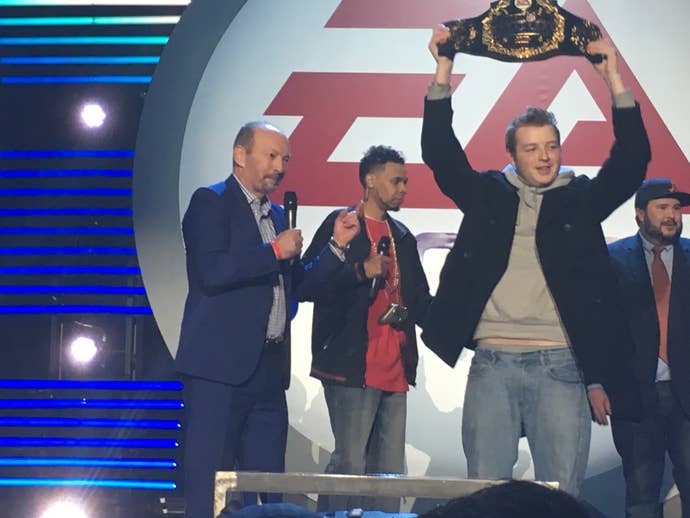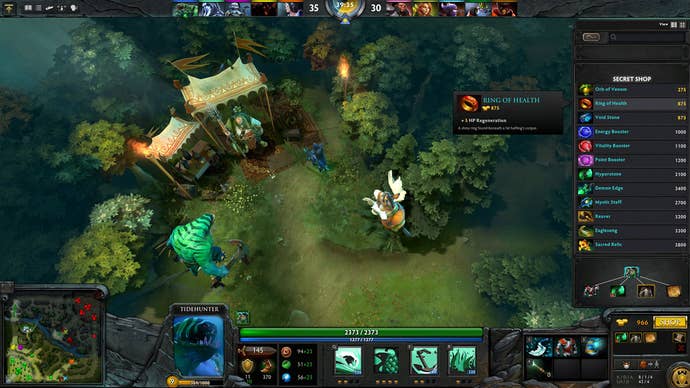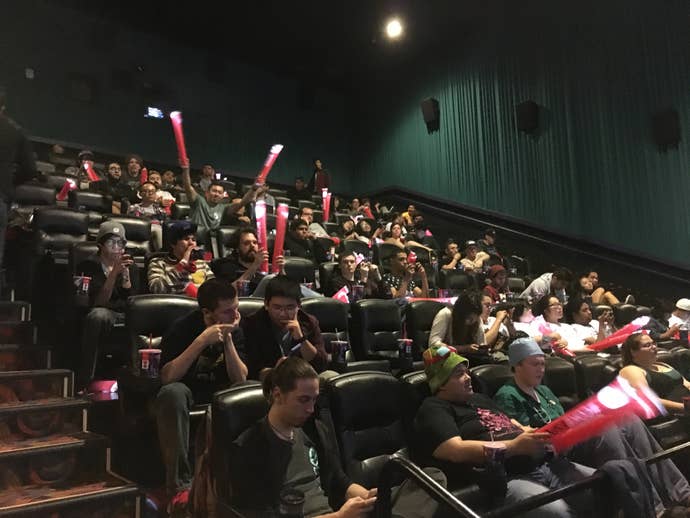The Race to Become the Next Big eSport
COVER STORY: From Halo to Rocket League, seemingly every developer wants their game to be a big-time eSport, and the stakes are even higher than you realize.
This article first appeared on USgamer, a partner publication of VG247. Some content, such as this article, has been migrated to VG247 for posterity after USgamer's closure - but it has not been edited or further vetted by the VG247 team.
After four months of competition, Michael Skimbo wasn't going down without a fight. He had erased a 21-10 second half deficit with a spirited comeback and forced overtime against Zackary "Serious Moe" Lane. Twenty-thousand dollars was on the line for the victor of EA's Madden Challenge tournament, which had kicked off back in November.
Around the San Francisco Masonic Center - where the event was taking place - assorted partygoers, hangers-on, and NFL fans milled around the open bars arranged along the stage area's perimeter. Many were waiting for Washington Redskins tight end Jordan Reed to take on Kansas City Chiefs safety Eric Berry in the Madden Bowl, which was the evening's main event. Few seemed to recognize the significance of what was happening onstage, which transcended the game itself.

For Electronic Arts, it was an opportunity to show that they were serious about eSports - a space where they've managed to make comparatively few inroads. They had been hyping the event for months across Madden and various social media channels, and Twitch was on-hand to stream the finals. For their sports games, at least, the 21st Madden Bowl was to be a kind of coming out party.
EA's efforts are in line with those of other publishers around the industry. Having fallen so far behind the biggest players in the scene, they are attempting a comeback mirroring that of Skimbo by repurposing the Madden Bowl as an eSports venue. Around the industry, developers large and small are scrambling to implement their own strategy. At stake is millions of dollars in revenue and a spot in gaming's global mindshare.
There's no longer any question of whether eSports have arrived. The only question now is who will be able to take advantage; what a spot at the top of the eSports heap will ultimately mean going forward, and whether it's ultimately too little, too late.
The stakes
At this point in the game, everyone has their own grand plan for catching up with League of Legends and DotA - the twin colossuses of eSports. In January, Activision Blizzard acquired Major League Gaming for $46 million, giving them an established platform for what they have dubbed 'the ESPN of eSports.' In December, EA created their own competitive gaming division led by veteran executive Peter Moore. Microsoft has their Halo Championship Series; and Blizzard has their Heroes of the Dorm competition, which confused a lot of traditional sports fans when it aired on ESPN last year.

But why does every game want to be an eSport? I found myself pondering this question last year after hearing that one game couldn't be demoed unless it had a shoutcaster commentating on it. What are publishers and developers hoping to get out of the massive investment required for development, marketing, and infrastructure?
I put this question to Jack Etienne, owner of Cloud9 - one of North America's most popular eSports teams. As you might expect, it mostly boils down to one thing - money. Top-tier competitive events can do big business. As an example, the International was able to raise some $70 million just through The Compendium - a crowdfunding mechanism through which they fund the event. Twenty-five percent of that goes to the prize pool, and the rest goes to Valve.
"It's a substantial amount of money from one event, and I'm fairly sure they didn't spend all of that [on overhead]. And along with it, usually companies are paying tens of millions of dollars for that type of visibility for their game, but they're actually making a profit on these events that are fantastic advertisements for their games," he says. "So, I feel like the publishers that have popular games are doing very well at esports."
"At the time, we didn't see Riot's really long-term vision and exactly how much they were going to invest in it, and it turned out they definitely made the right moves. And because of the work they did, eSports really was boosted much farther than it would be without the LCS. It put eSports on the map probably a good three to five years sooner than it would be otherwise."
Etienne himself has had a front-row seat for the rise of eSports. He got his start with the scene in an unlikely place - as an ad sales manager for the anime streaming service Crunchyroll. He developed a passion for eSports in his association with Team SoloMid, which he helped to build with ad deals in partnership with Crunchyroll. As SoloMid grew, Etienne became more and more taken with the eSports scene, where the site's team had gained a significant following. He eventually became an active partner, working to build TSM into more than an expensive hobby. It didn't take long for the potential of eSports as a revenue generator to become apparent. TSM's popularity made it easy to attract to a large number of sponsors, who Etienne further enticed with a large amount of data demonstrating his team's impact on their bottomline.
In 2012, Riot launched the League of Legends Championship Series, effectively bringing the main competitions in-house and making it easy for them to promote them via their client and elsewhere. Etienne describes it as a "bitter pill" at the time after all the work they had done building business with the various tournament. But with the benefit of hindsight, he credits much of the eSports scene's explosive growth to Riot's work building up the LCS. "At the time, we didn't see Riot's really long-term vision and exactly how much they were going to invest in it, and it turned out they definitely made the right moves. And because of the work they did, eSports really was boosted much farther than it would be without the LCS. It put eSports on the map probably a good three to five years sooner than it would be otherwise."
As a league of its own with, divisions, promotion and relegation, a regular season, and a postseason, the LCS has given developers a template for eSports going forward while also serving as a major watercooler event. Last year's final between SKT and the Koo Tigers filled Germany's Mercedes-Benz Arena and had a peak concurrent viewership of 14 million, with a unique viewer count of 36 million. As a point of comparison, the World Series averaged 14.7 million viewers last year. Riot admits that their League of Legends Championship Series is something of a loss leader for them, but its impact is clear. In the meantime, the LCS has driven interest in League of Legends, which generated some $1.3 billion in revenue in 2014.

The opportunity go beyond just raw viewership and sponsorships, too. "If you have a game that becomes a good esport, you'll end up having this really interesting thing happen where you can have more people almost watching your game being played than even playing it. If you're able to figure out a way to monetize off that viewership, I think you can make a lot of additional money," Etienne says. "So, for example, Counter-Strike, where they sell stickers around events called majors. There will be like four majors a year. The teams that are participating will have an in-game sticker that can be applied to their weapons. Those stickers, when they go for sale, they're bringing in enormous sums of money. Again, Valve is profiting off a large percentage of it. The teams also are making a lot of money off it, but the viewers get to participate in supporting their favorite teams or the events. They're spending a lot of time watching, but they're also buying these stickers to support their event, and that's all generated through eSports - through the fandom and the love of the game."
Nowadays, prize pools can rise as high as $18 million for events like The International. But as big as eSports have become, many publishers only now seem to be grasping the true implications of the scene's explosive growth. In an era of incredible uncertainty in gaming, where your average triple-A game can take millions of dollars over the course of several years, eSports is too lucrative to ignore. Now that Riot and Valve have shown the way, it's no surprise that other publishers are flocking to the scene with their own games. eSports is to gaming what MMORPGs were a decade ago. Everyone wants a piece of that sweet revenue stream.
It's also hard to ignore the opportunity to become part of gaming's cultural zeitgeist. Psyonix CEO and Rocket League design director Dave Hagewood puts it fairly succinctly: "We look at eSports as a way to keep Rocket League in the global mindshare. We want people to still be hearing about it, we want people to still be playing it – it's very hard to draw a direct line to how that profits us. It’s much more of a general philosophy of, 'Let's keep Rocket League popular.'"
And indeed, while Rocket League would have undoubtedly remained in the public eye for a while just by virtue of being really fun to play, a substantial eSports presence has a chance to keep it relevant indefinitely.

